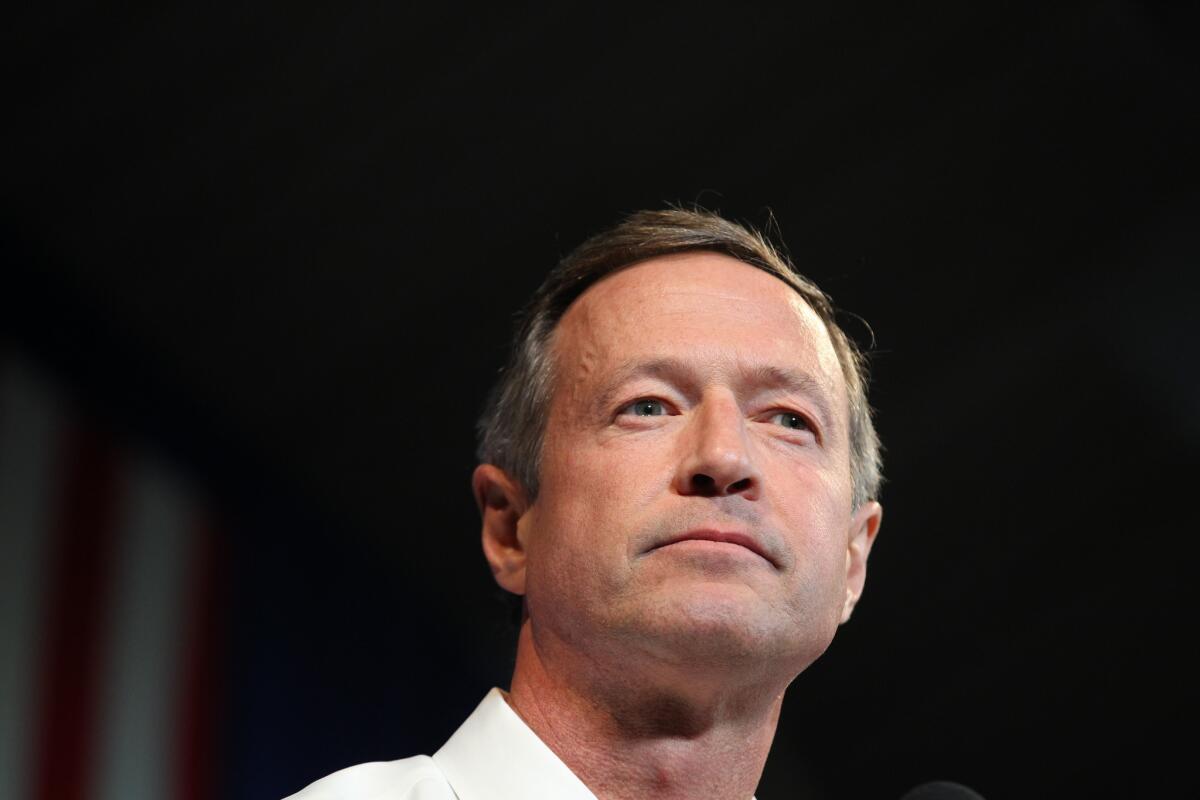Dissing Iowa? O’Malley throws caucus card down against Clinton

Former Maryland Gov. Martin O’Malley seized on a 4-year-old comment by rival Hillary Clinton to accuse her of disrespecting Iowa and its presidential caucuses.
- Share via
Is the way to Iowans’ hearts through their caucus?
Martin O’Malley apparently hopes so.
The former Maryland governor has been marginalized in what essentially amounts to a two-person race for the Democratic presidential nomination, trailing far behind Hillary Clinton as well as her main rival, Vermont Sen. Bernie Sanders.
So O’Malley this week seized upon a private comment Clinton made in 2012 about political caucuses, referring to the precinct-level gathering of campaign activists and partisan faithful as “creatures of the parties’ extremes.”
Which has a distinct ring of truth, however indelicate the phrasing, as it does take a certain out-of-the-ordinary willingness to participate given the extremes — of winter weather and prolonged procedure — it takes for Iowa caucus-goers to register their presidential favorites.
Rushing the battlements (or at least taking to the radio airwaves), O’Malley immediately declared his umbrage on behalf of the Hawkeye State and its civic-minded masses.
“The people of Iowa who go to their caucuses are people that care very passionately about our country,” O’Malley said Wednesday in a Radio Iowa interview. “They have a lot of different opinions, and perhaps if Secretary Clinton were out, going county to county, she’d see that herself.”
Clinton has suffered “a long-strained relationship with Iowa,” O’Malley persisted. “I think she’s been disappointed in the past by not prevailing in the caucuses, and perhaps that’s why she still feels the way she does.”
Clinton’s denigration of caucuses, contained in the most recently disclosed cache of private emails she wrote as secretary of State, is hardly a surprise — though the Democratic front-runner now loves, loves, loves Iowa.
Clinton “has been committed to earning the support of every Iowan in February’s caucus,” spokeswoman Lily Adams told Iowa Radio in response to O’Malley’s gibes, meeting voters “in town halls, coffee shops and living rooms.”
Eight years ago, campaign aides were critical of the Iowa caucuses even before Clinton lost the state to Barack Obama, saying the restricted hours and length of the gatherings — which can go well into the night — could prevent many of her backers from showing up. Some suggested she skip the state altogether, advice Clinton may have wished she heeded.
In her concession speech, Clinton made no effort to hide her frustration.
“You know, there were a lot of people who couldn’t caucus tonight,” Clinton said in January 2008. “They are in Iraq or Afghanistan or somewhere else serving our country. There are a lot of people who work at night, people who are on their feet, people who are taking care of patients in a hospital, or waiting on a table in a restaurant, or maybe in a patrol car keeping our streets safe.”
Working behind the scenes, Clinton’s allies have since helped push through changes to the Iowa caucuses, set for Feb. 1, that address at least part of her criticism. For the first time, there will be “satellite caucuses” at nursing homes and other locations where Democrats might otherwise be precluded from attending. Accommodations might also be made for overseas military personnel.
Ever since the 1970s, when Iowa gained political import as the first state on the presidential election calendar, there have been caucus-bashers, mostly outside the state but not always.
In 1987, Tennessee Sen. Al Gore used Democrats’ big annual Jefferson-Jackson dinner in Des Moines to sprinkle ashes in the punch bowl, telling the gathering of party faithful they were ideologues who enjoyed too much influence over the presidential nominating process.
Thus ended his campaign.
All was forgiven, however, by 2000, when Gore handily won the Iowa caucuses after lavishing time and attention on the state. (“Growth and maturity” was how the vice president explained his newfound appreciation.)
Howard Dean didn’t fare as well in 2004.
Less than two weeks before the caucuses, an interview surfaced in which Vermont’s former governor disparaged the caucuses using language very similar to Clinton’s.
“If you look at the caucuses system, they are dominated by the special interests in both parties,” Dean said in 2000 on a Canadian public affairs program. “[And] the special interests don’t represent the centrist tendencies of the American people. They represent the extremes.”
The clip was widely rebroadcast in Iowa, badly damaging the front-running Dean, who finished a poor third in the caucuses and, like Clinton in 2008, never recovered.
Follow @markzbarabak for national & California politics
ALSO
A shooting back home: Congress reacts to another tragedy
The undertow in a new California poll: economic and political unease
Scrooge-like charities ruin more than Christmas for everyone
More to Read
Get the L.A. Times Politics newsletter
Deeply reported insights into legislation, politics and policy from Sacramento, Washington and beyond. In your inbox twice per week.
You may occasionally receive promotional content from the Los Angeles Times.











